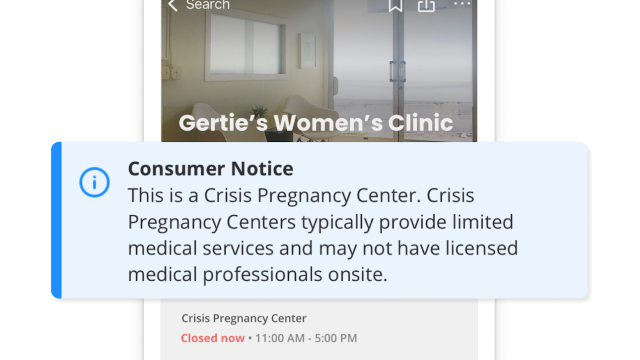Yelp now shows a warning alongside every crisis pregnancy centre (i.e. anti-abortion centre) listing on its platform. The alert reads, “Consumer Notice: This is a Crisis Pregnancy Centre. Crisis Pregnancy Centres typically provide limited medical services and may not have licensed medical professionals onsite.” It’s a move that comes amid a trend of tech companies and their workers reacting to the overturn of Roe v. Wade.
The business review site already labels thousands of anti-abortion centres as distinct from actual clinics or abortion providers with the title “Crisis Pregnancy Centre” or “Faith-based Crisis Pregnancy Centre.” That change began in 2018, following a company-wide effort to manually sort through and recategorize all of the platform’s related listings, which the site says is ongoing.
“We’ve continued to regularly audit and investigate these businesses – in 2022 alone, we have proactively evaluated nearly 33,500 U.S. business pages and recategorized nearly 470 business pages as Crisis Pregnancy Centres or Faith-based Crisis Pregnancy Centres (as of August 8, 2022),” Yelp wrote in a Tuesday news release.
And the company also claimed that it’s made efforts to align reproductive health search results with what users are looking for. “Over the past several months…we’ve increased our efforts to protect our users and provide them with access to the information they’re looking for, which includes better matching them with reproductive health services that actually offer abortion when they are searching for abortion services and making it less likely they will see crisis pregnancy centres that don’t,” said the press statement.
But now, Yelp users will get just a little bit more, prominently displayed context about the risks of visiting anti-abortion centres.
Though, the disclaimer doesn’t address all of the common, major criticisms of these businesses. The issue of so-called crisis pregnancy centres isn’t just that their medical services are incomplete, but also that they purposely hinder abortion access.
These centres are places that market themselves to pregnant people and those seeking abortions by self-labelling as clinics, pregnancy care centres, pregnancy resource centres, or under many other, similar names.
They often provide some medical services like STI testing, ultrasounds, and pregnancy tests (along with things like diapers and parenting classes). However, their main purpose is generally not to provide comprehensive medical care, but to dissuade people from accessing abortion via any means they can: delay, misinformation, deceptive counseling, guilt, and shame are just some of the tools these centres rely on. (Fun fact: anti-abortion centres are funded, in part, with federal and state tax dollars.)
Other tech giants have also been grappling with how best to manage abortion-related content in the wake of June’s Supreme Court decision. Last month, YouTube (owned by Google/Alphabet) announced new efforts to combat abortion-related misinformation on its site, and TikTok enacted similar changes. Earlier this summer, Google also introduced some small changes to the disclaimers they put on anti-abortion centre advertisements (though the company still allows these advertisements to persist, for now).
Yet some company’s efforts have been more successful than others. Facebook ended up removing lots of posts intended to provide information about medication abortion and abortion pills, and later admitted to “incorrect enforcement.” Not to mention all of the issues of abortion restrictions and privacy that Meta and other companies have been avoiding tough questions on. Earlier this month, Meta shared private messages with Nebraska police that aided in the arrest of a mother and daughter over an alleged illegal abortion. Pregnancy and period tracking apps have also come under fire for mishandling user data. And many data brokers even sell information specifically on pregnancy status.
